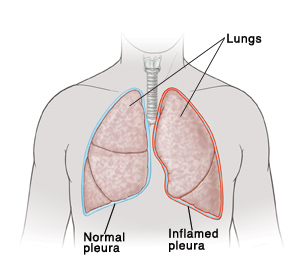Pleurisy
You have pain in your chest. Your healthcare provider has told you that you have pleurisy (pleuritis). Pleurisy is swelling (inflammation), irritation, or infection of the pleura. The pleura are 2 layers of thin, smooth tissue that surround the lungs and line your chest wall.
Pleurisy occurs when inflammation affects the pleura. Normally, there is a small amount of fluid in between the pleura. This fluid helps the pleura move smoothly past each other when you breathe in and out. But when you have pleurisy, the swollen pleura rub against each other when you breathe. This is very painful.
 |
| Pleurisy is inflammation of the pleura. The pleura cover the lungs and line the chest. |
What are the symptoms of pleurisy?
Pleurisy often causes sudden sharp and stabbing chest pain. Sometimes the pain may become a constant dull ache. It's often worse when you take a deep breath, cough, or sneeze. Shortness of breath is also common. Based on the cause of pleurisy, you may also have fever, unexplained weight loss, and body aches.
What causes pleurisy?
Many things can cause pleurisy, such as:
-
Viral infections (like the flu)
-
Pneumonia
-
Cancer
-
Lung diseases
-
Tuberculosis
-
Asbestos-related disease
-
Inflammatory bowel disease
-
Chest injuries or surgeries
-
Pancreatitis
-
Medicine reactions
-
Autoimmune disorders, such as lupus, familial Mediterranean fever, or rheumatoid arthritis
-
A blood clot in the lung (pulmonary embolism)
-
Air between the pleura (pneumothorax)
-
Large amount of extra fluid in the pleura (pleural effusion)
-
Blood buildup in the pleural space (hemothorax)
Serious heart problems that can cause pleurisy include:
How is pleurisy diagnosed?
Your healthcare provider examines you and asks you about your symptoms and health history. They will first check you for the serious causes of chest pain. You may have:
-
Lab tests
-
Imaging tests, such as chest X-ray, CT scan, chest MRI, or ultrasound
-
ECG
-
Arterial blood gas test
-
Fluid taken from the pleural space (thoracentesis) and checked in a lab
How is pleurisy treated?
Treatment depends on what is causing the pleurisy. Serious conditions are treated in the hospital. You may need fluid, air, or blood removed from the pleural space. You may need medicines to reduce the inflammation or treat the infection, pain, and other symptoms caused by the condition.
When to call your healthcare provider
Call your healthcare provider right away if you have:
-
A fever of 100.4°F (38°C) or higher, or as directed by your provider
-
Unexplained weight loss
-
Chest pain that doesn't go away after treatments
-
Fast heartbeat
Call 911
Call 911 if any of these occur:
-
Trouble breathing or wheezing
-
Shortness of breath or chest pain that gets worse after treatments
-
Unable to talk
-
Feeling faint or dizzy
-
Skin or lips that turn blue, purple, or gray
-
Feeling of doom